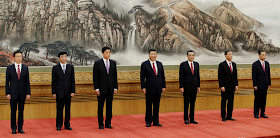(Cuban Interior Ministry's Colonel
Ramiro Ramirez, who leads a team investigating U.S. complaints of
"attacks" on diplomats in Havana, speaks during an interview at the
Hotel Nacional in Havana, Cuba, October 22, 2017. REUTERS/Alexandre Meneghini)
In an earlier post I had suggested that the United States and Cuba have begun the "litigation" phase of their state-to-state conflict in the
courts of public opinion. "The objectives are fairly simple--to sway
Western public opinion (and thus to manage pressure in the liberal
Western democratic traditions of the rules of play, and to stoke the
usual fears in the Cuban population-the fear of invasion, the fear of
subversion, and the fear of the old imperial power seeking some sort of
new neo-colonialist relationship with the people (that is the state). . . . During the litigation phase both parties begin a process of strategic
disclosures and assertions based on evidence that they produce to suit
the development of their "case."" (
HERE)
The U.S. has been carefully developing its case the way American prosecutors eager for victory might approach a prosecution: tight control of witnesses, careful deployment of the science, and the development of plausible interpretation of events from the construction of a case built on circumstantial evidence and interpolations (e.g.,
here, and
here). The consequence. of course, is that there is relatively little by way of vigorous cooperation from the U.S. side.
On the Cuban side, there is also little incentive to cooperation. Cuba does not trust the U.S. And Cuba has secrets of its own, even without the distraction of the Affair of the Sonic Weapons Attack. Cuba has been approaching the case, then, the way a defense lawyer might consider: denial, demand for proof, the assertion that the U.S. bears the burden of proving (perhaps without a reasonable doubt) that there was an attack and that the Cubans had a hand in it (or someone else).
At this stage, of course, the denials and demand for (usually public persuasive) proof has put the U.S. to its evidence and raised the stakes. That has become clear from recent reporting from Reuters: Sarah Marsh and Nelson Acosta,
Cuban Investigators Call US Sonic Attack Allegations ‘Science Fiction’ Reuters (24 October 2017). The reporting follows below.
Read carefully, what is clear is not that the attacks are implausible, but that the United States must be put to its proof, and that, at this stage, that proof is lacking. The political difficulty, though, is that this is not a criminal case, and the United States is not the state prosecutor with substantial authority over the body of the defendant (the Cuban state). The two states provide mirror images of each other in both their approaches and action. The current posture, though,will provide only momentary advantage.
At some point and soon, the case will have to advance beyond controlled disclosure and name calling. It is at that point that this Affair will become interesting-- both states appear to be hiding something and both appear willing to protect their secrets even as they gamble that they can make the other side disgorge valuable (in terms of political advantage) their secrets.
Or more likely, it will serve as the excuse the right wing factions of both governments need to shift their respective governments away from normalization. For the Cubans that will include a calculation that they can survive a renewed American hostility, which will in turn result from a calculation of the weakness of the current American administration in global circles. This is a miscalculation that Cuba and other states have made to their regret at various times since 1945 and reflects the error of relying too much on the propaganda and pseudo analysis in social media the purpose of which has always been to present a calculated vision for mass consumption. For the U.S. that will include a calculation of Cuban weakness and of the ability to use popular pressure to change Cuban internal policy. Implicitly, it is also a calculation that Cuba will have no place else to turn--a miscalculation that the U.S. has made with some frequency since the 1960s.
Substituting hope for analytical rigor, when that may entail giving up on ancient dreams and objectives is a hard thing for key players on both sides of this Affair. It is regrettable that the rest of the stakeholders in both states have abdicated any responsibility for setting this right without unnecessary disadvantage to either state. Yet there is a calculation to all of this as well, one in which news media tend to be complicit. And that is the shared calculation by both sides--that U.S. and Cuban political classes, and those in the media and intelligentsia that serve them, can act to personal advantage because all consequences of risky behavior are borne by their respective populations. It is this detachment between action and consequence (the risk takers do not bear the costs of risk) that has unbalanced the entire calculus in this instance.
























